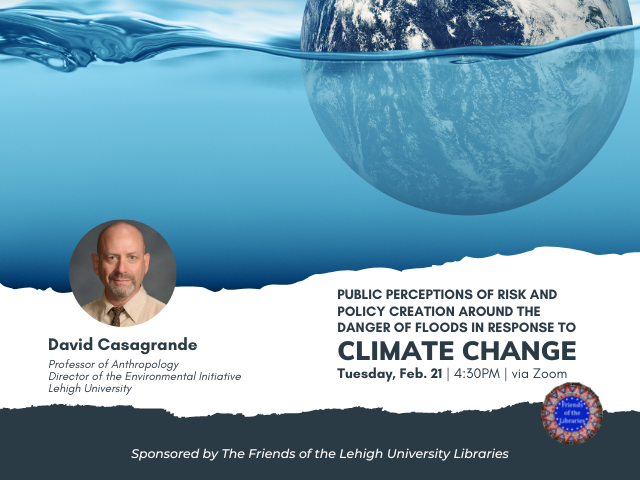The Friends of the Lehigh University Libraries invite you to join us on Tuesday, February 21 from 4:30 p.m. to 6:00 p.m. via Zoom for Public Perceptions of Risk and Policy Creation around the Danger of Floods in Response to Climate Change, presented by Dr. David Casagrande, Lehigh Professor of Anthropology and Director of the Environmental Initiative.
Flood-related disasters in the US are increasing as a result of climate change. In the coming decades, public policy must also account for “managed retreat” from flood-prone areas. Professor Casagrande will describe the current policy context of managed retreat and present research he has conducted with people living in flood-prone areas in the Midwest US and on Maryland’s Eastern Shore. Interestingly, flood risk is determined not only by climatic and hydrological processes, but also by individual perceptions of risk, local flood mitigation, and attitudes about government programs like buyouts of homes and flood insurance.
Professor Casagrande will describe how risk perceptions are constructed as a social process in which political ideology, religious beliefs, and water-based livelihoods interact with lived experiences of flooding. Research results highlight disconnections between public beliefs, local emergency planning, and federal policy. If these issues are not addressed, climate-induced changes in floodplains will produce unnecessary loss of residential equity and negative impacts on the quality of life of many people.
The lecture will be followed by a Q&A session led by University Librarian Boaz Nadav-Manes. This event is free and open to the public.
Please register in advance. After registering, you will receive a confirmation email containing information about joining the meeting.
About the speaker:
David Casagrande is a professor of anthropology and Director of the Environmental Initiative at Lehigh University in Bethlehem, Pennsylvania. He has studied relationships between human culture and natural environments in Mexico, Venezuela and the United States with an emphasis on policy and planning. He worked as a policy analyst in state and local government for ten years. His research areas have included how Tzeltal Maya use medicinal plants, decisions about water in the American Southwest, response to flooding and climate change, and impacts of extractive technologies like hydraulic fracturing for natural gas. He currently collaborates in US and international teams studying decisions to relocate in response to disasters and climate change. His work has appeared in journals like Environmental Management, Environment & Behavior, Human Organization, Society & Natural Resources, and Frontiers in Ecology & the Environment. From 1999 to 2003 he was Editor-In-Chief of the Journal of Ecological Anthropology. His research has been supported by the National Science Foundation, National Sea Grant Program, the Japan Foundation, and other sources.
Sponsored by The Friends of the Lehigh University Libraries.
